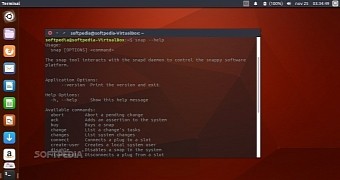Michael Vogt from Canonical's Snappy team was pleased to announce the immediate availability of version 2.23 of the Snapd daemon that provides support for Snap packages in Ubuntu and other GNU/Linux distributions that have adopted Snappy.
Snapd 2.23 is supposed to be a major release, and we can't help but notice that there are quite some new features implemented, starting with support for GalliumOS, a fast and lightweight GNU/Linux distribution designed for Chromebooks, as well as the new Linux Mint 18.1 "Serena" operating system, which is based on Ubuntu 16.04 LTS.
Yes, you're reading it right, you can now install Snaps in Linux Mint 18.1 and GalliumOS if you have Snapd 2.23 or later installed. Among other new features, we can mention support for "send*,recv*" syscalls on all interfaces, seeding support on classic confinement, shell completion for connect, and a bunch of UI improvements.
New and updated interfaces
The Snapd 2.23 release moves the auto-refresh functionality inside the daemon, updates the "snap info" command to also display contact information, makes use of xdelta3 from the core snap, and it now creates a "current" symlink in the user-data directory. Several bugs have been fixed as well.
Additionally, the new release introduces a bunch of new interfaces, namely unity8, linux-frame-buffer, classic-support, thumbnailer, and network-setup-control, and updates many of the existing ones, including unity7, udisks2, core-support, firewall-control, screen-inhibit-control, hardware-observe, kernel-module-control, network-control, serial, and default.
"The snappy team is happy to announce the new snapd 2.23 release! The new release is available in the 'core' (and 'ubuntu-core') snap on the 'candidate' channel and also in the Ubuntu 14.04, 16.04, 16.10 'proposed' pockets and in 17.04," said Michael Vogt in the mailing list announcement.
As you can see, Snapd 2.23 is now available in the proposed repositories of Ubuntu 14.04 LTS (Trusty Tahr), Ubuntu 16.04 LTS (Xenial Xerus), and Ubuntu 16.10 (Yakkety Yak) operating systems, as well as in the upcoming Ubuntu 17.04 (Zesty Zapus) release, and can be installed if you run the following command in a terminal emulator.
sudo snap refresh --beta core

 14 DAY TRIAL //
14 DAY TRIAL //